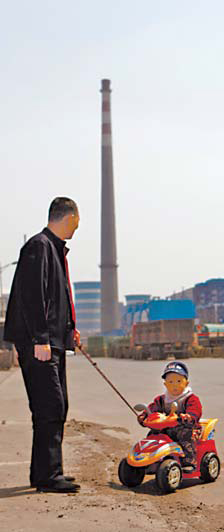Economy
Tough time for towns where mines run dry
By Hu Yinan (China Daily)
Updated: 2010-04-16 07:42
 |
Large Medium Small |
Stuck in the middle
After several protests by villages against mining activities in the late 1970s, the Shandong government established a department called the "office for villages' relocation for mines", which acts as a coordinator between residents and mine owners.
|
||||
"Depending on the level of physical damage done to the property, we ask mines to compensate farmers and, if need be, request towns and villages to come up with a plan to relocate."
Under the law, all mines are required to have exploitation plans and must report to the relocation department if they want to dig under a building or farmland. If relocation is necessary, mine owners must also hire accredited agencies to conduct a thorough site review and submit a relevant report to authorities.
"But in many cases the rules aren't enforced," complained Zhao, who joined the department in 1986. His office, which has only five staffers, is often caught in an embarrassing position when negotiating terms because it has neither the administrative right to enforce laws, nor any power to push the boundaries.
When asked by China Daily, Wang, director of Zaozhuang's information office, was not aware of where Zhao's office was or even what department it belonged to.
"In the end, what typically happens is that when coal prices are low, mines have a hard time operating and say they don't have enough to compensate farmers. They all acknowledge the losses their operations incur. But they just can't or don't pay," said Zhao.
Mining companies are asked to pay farmers between 500 and 900 yuan per year for every mu - a Chinese measurement equal to 0.06 hectare - of arable land entirely depleted by their activities. They are also required to hire a finite number of local landless farmers to ease both unemployment and tensions.
For farmers who see their harvests reduced as a result of mining, companies are generally asked to give one-time payments of several thousand yuan, or the approximate income for three to four years' harvest.
The companies also should pay farmers 1,000 yuan of reclamation fees for every mu of affected arable land.
"Over-exploitation has increased our workload," added Zhao. "In an ideal world, we need mining companies to work by the rules, instead of trying to cover up after a loss and make under-the-table deals with the village cadres. But this will take time."
Cause and effects
Although Chinese authorities continue to steer towards a green economy, residents in resource-dependent cities say they expect the environmental impacts of mining to far outlast the jobs.
|
 |
|
A man plays with his grandson near a large coal mine in Zibo. |
According to citizens, by 2007, water sources even as far as 120 meters underground had been contaminated, forcing the town government to buy a 250-meters - by 100-meters water tank to ensure everyone has clean drinking water.
Residents also claim the vast number of empty pits is causing land to sink, with many citing an incident in Beijin village in 2008 when a three-story office building sunk 60 meters the night before it opened. The Beijin Group, which owned the building, acknowledged the incident happened but declined to comment further when contacted by China Daily.
Despite their complaints about the mining industry, however, many locals said they cannot imagine life without the mines.
Bian Yubing, head of Hong Huayuan village, also in Fenghuang, said almost all the young men in the area are employed by nearby mines.
"You have to understand the situation here. If we solely relied on farmland, we wouldn't even have enough to eat," he said.
(China Daily 04/16/2010 page1)







